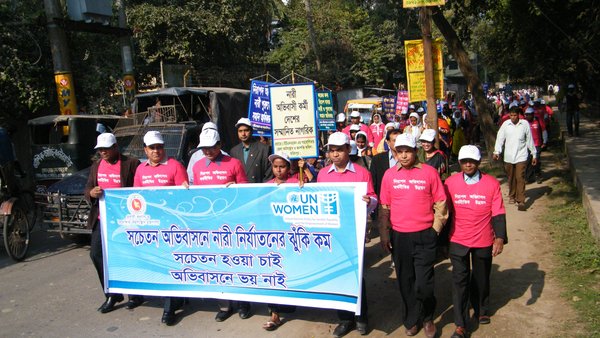
Photo via MIDEQ Hub.
Should academics remain content with merely producing academic outputs as they research and study issues of access to justice in migration? Or can they and should they engage more actively in addressing these injustice? MIDEQ researchers and partners share their views .
In its study of the relationships between South-South migration, (in)equality and development, the MIDEQ Hub has developed a theory of change (ToC) centred around capacity-building, improving the lives of migrants and their families, and changing narratives. The ToC is in part a reflection of the significance that research funders, particularly in the United Kingdom, attach to research impact and how it may benefit society at large. But it is also in part a self-reflection by researchers on how their research can be made more meaningful to, and less extractive of, those who are the subject of their research. Researchers have a role to play in influencing change in ways that go beyond academic publications. During the MIDEQ symposium held in Rio de Janeiro, 17-24 September 2023, MIDEQ researchers and partners had the opportunity to deliberate upon the role of the academia in promoting access to justice (A2J) for migrants, which is one of MIDEQ’s core thematic areas.
A broader understanding of A2J
A2J is most commonly associated with legal and juridical processes and remedies. However, MIDEQ’s work in various country and regional contexts has revealed that for many migrants, and indeed, other marginalised groups, A2J relates to issues of equality in treatment, human dignity, respect for human rights, and broader issues of social justice. This broad understanding, elaborated in the MIDEQ UNU-CPR discussion paper Shrinking the Justice Gap, formed the conceptual premise and context for our symposium session on how academics might more meaningfully engage with issues of A2J for migrants.
Drawing upon their experience working with migrants, not only through research but also in MIDEQ’s Impact Interventions, the session panellists and participants highlighted a number of points and approaches worth considering in the promotion of A2J for migrants and in migration research.
Re-thinking our approach to migration research
As was pointed out by one of the participants, one of the problems with migration research is ‘migranticization,’ i.e. “enlisting migration or ethnicity as the central criterion of difference in research questions and design, data collection, analysis and theory, even when it may not be empirically relevant”. As one speaker put it, “people do not act in the public sphere as ‘migrants’”. Rather, immigration status should be seen as a ‘governmental category of the nation state’ and as a characterization that may not always be relevant, even empirically, for examining societal processes and issues such as the injustices that people face. Hence, the migrant characterization in migration research can not only serve to blur intersecting injustices equally faced by citizens but may also be a tool of exclusion.
Related to this was the issue of being conscious of the language that we use in migration scholarship. This point further emphasised an issue that MIDEQ researchers had explored in more detail in a recently published article on the language of migration. In the article the authors urge researchers to be cognisant of the terms that they use, and “their power to control and contain, to limit our thinking, to reproduce inequalities in how we understand and represent migration.” The same should apply in our examination of A2J.
Confronting capitalism
Capitalism, as was noted, underlies many of the exploitative processes, not least the unequal distribution of wealth and resources among peoples and countries, which (re)produce many of the injustices in migration and by migrants, including their lack of A2J. Despite the noticeable linkages between capitalism and lack of A2J, participants agreed that the analysis of capitalism vis-à-vis A2J and other aspects of global inequality seemed to be lacking in MIDEQ’s work, and migration research generally. It was therefore suggested that researchers and academics should examine more deeply the broader political and economic processes that impact migration as opposed to studying migration per se. Hence, the question of how academia can deal with capitalism and other structures of power deserves serious consideration among scholars and other actors in the field of migration and justice.
Broadening and deepening engagement
Participants noted the need for coordination of migration research and studies with broader political action, including engaging more with politicians and policymakers, at all levels of governance. It is also important to increase engagement with civil society organisations (CSOs), non-governmental organisations (NGOs) and local communities including migrants. From the experience of various MIDEQ researchers, it was important that these stakeholders are involved in the design and execution of the project, which may avoid simply instrumentalising them for our own research purposes. As an example, academics could invite CSO representatives into classrooms and also send out students into the communities to learn about CSOs and their work.
The active involvement of migrants at all levels of the research process was highly recommended, with one participant strongly advocating for migrant representation on project advisory boards. This way, migrants can challenge academics with their experience and knowledge, leading to improved research approaches and more meaningful outcomes. Important too is the inclusion of migrants as researchers on projects to better understand their situation. In this regard, it was proposed that researchers should challenge assumptions of academic institutions and any inhibiting approaches that fail to incorporate migrants in the research process. Moreover, the empowering of migrants as sources of knowledge should not just stop at involving them in research, but where possible provide opportunities for co-production and co-publishing with researchers as illustrated in some of MIDEQ’s outputs from Ethiopia, the Brazil- Haiti corridor, and South Africa.
The main emphasis was on bringing various people and stakeholders together thus expanding our audience and modes of outreach. One of the ways for improving outreach to migrants would be through the use of digital technologies, particularly those that have been developed with and for the benefit of migrants. This way academics could make their research more accessible to a diverse audience.
Moving forward
The session concluded not with clear answers, but with perhaps more questions on how we, as academics and researchers, can further promote A2J for migrants and in migration research. How best can countries integrate A2J for migrants in their governance? Is the bottom-up approach the way to promote justice, and how best can we mobilise and harness the power of the grassroots? Reflecting on these and more questions should influence how we go about our academic and scholarly work involving A2J in migration and for migrants.



